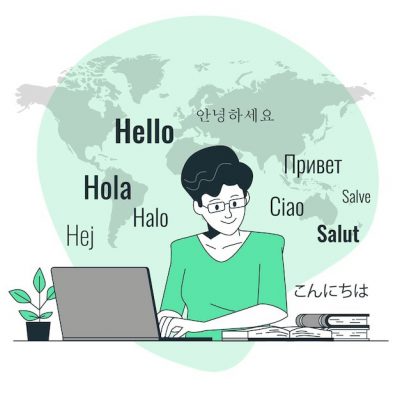Translation vs. Interpretation: Do You Know the Key Differences?
Many companies around the world have
started to achieve huge revenues by globalizing their businesses. This could
never be done without using various language services.
Although translation and interpretation
may be the same in terms of communicating the meaning of a source language to
the targeted one, they are different in many aspects. This means that you have
to learn their distinctions before selecting your service.
What Is Translation?
- The translation is conveying an original written text of one language to another one including the message, idioms, and verbal signs.
- It is about a written text which a translator delivers to the target language using his tools such as dictionaries, software tools, glossaries, and other reference materials.
- While a translator should possess both the linguistic and cultural backgrounds, he cares more about the written text.
- Interpretation
is an immediate service that happens either during a live speech or after it.
- An
interpreter does not have dictionaries, scripts, or glossaries. He/she depends
only on his experience, knowledge, and memory.
- Interpreters
also need to be fluent in both languages with an exceptional listening ability.
- They
should not have to be perfect since they care more about the meaning and
culture of both languages.
- Interpreters
most commonly work on live projects such as conferences, video calls, live TV
coverages, and online meetings.
- With
the increase of globalization, business owners find themselves exposed to
different languages, and thus they need interpreters to communicate with
business stakeholders during business meetings and live conference calls.
Differences between Translation and
Interpretation
Personal Skills
- On the one hand, an interpreter should be a good
listener as he/she translates on the spot. They have to be fast in perceiving the
meaning of the spoken discourse to transfer it as fast as it can be to the
audience. That is why interpreters need to have the ability to work under
stress.
- On the other hand, a translator should be a good
writer in terms of selecting the right linguistic rules and punctuation.
Accuracy
- A translator is accurate as his/her main
concern is delivering the same meaning into a written text taking into account
the punctuation and grammatical rules.
- Perfection is the last thing for an interpreter
to care about. His/her main target is to paraphrase the same meaning into the
target language considering the culture, body language, and tone of voice.
Knowledge
- While translators should have strong background about
the culture of the target language, they also have to be talented in using
written materials such as dictionaries, glossaries, and scripts. Most
translators are native in the target language and fluent in the source one.
- An interpreter translates based on his experience,
cultural knowledge, and vocabulary memory.
Top 4
Industries That Use Translation and Interpretation
Healthcare
- Since health and medicine are global industries, it is
always prerequisite for a hospital or a clinic to have interpreters to translate
oral communication between patients and doctors to avoid any medical mistakes.
- Medical booklets, dosages, prescriptions, and other
medical instructions need to be translated.
Entertainment
- Interpretation in needed in all media industries such
as TV programs, music, films, live shows and concerts.
- Art and entertainment achieve huge revenues and this
could not be done without translation as everything is exposed to people from
different languages. Translation is needed for subtitling the audio visual
content to be available for people from other languages. Most streaming
services now have their films, TV shows and other media available in many
languages.
- Websites and
mobile applications are now localized into the culture of various targeted
languages.
Law
- In towns that have people speak different languages,
interpreters are needed in offices and courtrooms.
- Translation is also used in the law industry to
translate legal documents, cases, verdicts, certificates…etc.
Business
- In global business, interpreters are needed to
translate oral meetings and videos of clients, partners, and stake holders.
- Translation have become necessary if the business is
expanded globally especially in the technology industry. Software documents,
marketing materials, and website contents need to be localized.
Help your business grow globally by selecting the best language service from our services.
